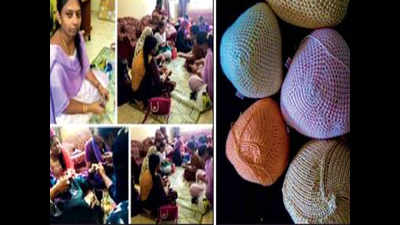- News
- City News
- chennai News
- The sisterhood of knitters
Trending
This story is from September 20, 2020
The sisterhood of knitters
In 1995, Srividya Gopinath’s mother-in-law succumbed to breast cancer. To date, a memory that hangs heavy on the family is the trauma she underwent following the mastectomy.

Women knit and crochet knockers for cancer patients
In 1995, Srividya Gopinath’s mother-in-law succumbed to breast cancer. To date, a memory that hangs heavy on the family is the trauma she underwent following the mastectomy.
In August last year, the Chennaibased learning and development professional started crocheting breast prostheses. And with that, she became part of an all-women’s army across the country and abroad, who knit and crochet lightweight breast prostheses, or ‘knockers’, for those who have undergone mastectomies, lumpectomies and radiation, or are undergoing reconstruction — and cannot afford, or opt out of silicon alternatives.
The force that brings these volunteers together is Jayashree Ratan — originally from Chennai, now in Mumbai — who founded Saaisha India, a charitable organisation registered with Knittedknockers.org of the US, which creates and distributes these prostheses free of cost to breast cancer survivors.
Ratan, an avid crocheter and record holder in the craft, volunteered with Knitted Knockers in the US, and tried to recreate them for a few known women back in India in 2018. But as word spread, demand grew, and what had started with three volunteers, grew into a 170-member strong team of crocheters and knitters who create knockers from their homes for Saaisha today. They put in money to buy mercerised cotton yarn for the products that come in five sizes, and can last anywhere between 18 months to two years.
Sugantha Venkataraman, 77, was diagnosed in October 2017 and underwent surgery in December, three months after which her doctor referred her to Ratan’s charity. “She knew I could knit and crochet, and suggested I become both a volunteer and a beneficiary of Saaisha’s work,” says Sugantha, who learned to create the knockers from YouTube tutorial videos. “For younger survivors, the knockers can bring back confidence, and help put behind what they’ve gone through sooner. Senior survivors like me may often experience muscle and tissue growth near the arm, which the knockers provide solid support for, and make it comfortable to go about life,” she says.
Sixty-year-old Anita Nagesh from Tumkur in Karnataka decided to start going out a year after her surgery. “My family had made my phase through treatment easier, but after a mastectomy, finding a social life was smoother with the knockers,” she says. “I am a counsellor and have gotten back to work. I now feel a sense of control when I meet and interact with people. It’s liberating.”
In August last year, the Chennaibased learning and development professional started crocheting breast prostheses. And with that, she became part of an all-women’s army across the country and abroad, who knit and crochet lightweight breast prostheses, or ‘knockers’, for those who have undergone mastectomies, lumpectomies and radiation, or are undergoing reconstruction — and cannot afford, or opt out of silicon alternatives.
The force that brings these volunteers together is Jayashree Ratan — originally from Chennai, now in Mumbai — who founded Saaisha India, a charitable organisation registered with Knittedknockers.org of the US, which creates and distributes these prostheses free of cost to breast cancer survivors.
Ratan, an avid crocheter and record holder in the craft, volunteered with Knitted Knockers in the US, and tried to recreate them for a few known women back in India in 2018. But as word spread, demand grew, and what had started with three volunteers, grew into a 170-member strong team of crocheters and knitters who create knockers from their homes for Saaisha today. They put in money to buy mercerised cotton yarn for the products that come in five sizes, and can last anywhere between 18 months to two years.
“It started as a meaningful stepup to my crocheting, which until then was limited to gifts made for friends and family. But over the course, I’ve heard from beneficiaries — many of who I’ve never met — about how their lives have turned around, almost completely,” says Ratan, a retired teacher, adding that often doctors and hospitals aren’t aware that these options exist. “A mastectomy can be immensely altering, physically and emotionally. Our beneficiaries tell us the products give them a fresh lease of life, and how they can now walk to the market or wear a T-shirt they loved, with the kind of confidence they haven’t felt since surgery,” she says.
Sugantha Venkataraman, 77, was diagnosed in October 2017 and underwent surgery in December, three months after which her doctor referred her to Ratan’s charity. “She knew I could knit and crochet, and suggested I become both a volunteer and a beneficiary of Saaisha’s work,” says Sugantha, who learned to create the knockers from YouTube tutorial videos. “For younger survivors, the knockers can bring back confidence, and help put behind what they’ve gone through sooner. Senior survivors like me may often experience muscle and tissue growth near the arm, which the knockers provide solid support for, and make it comfortable to go about life,” she says.
Sixty-year-old Anita Nagesh from Tumkur in Karnataka decided to start going out a year after her surgery. “My family had made my phase through treatment easier, but after a mastectomy, finding a social life was smoother with the knockers,” she says. “I am a counsellor and have gotten back to work. I now feel a sense of control when I meet and interact with people. It’s liberating.”
End of Article
FOLLOW US ON SOCIAL MEDIA










